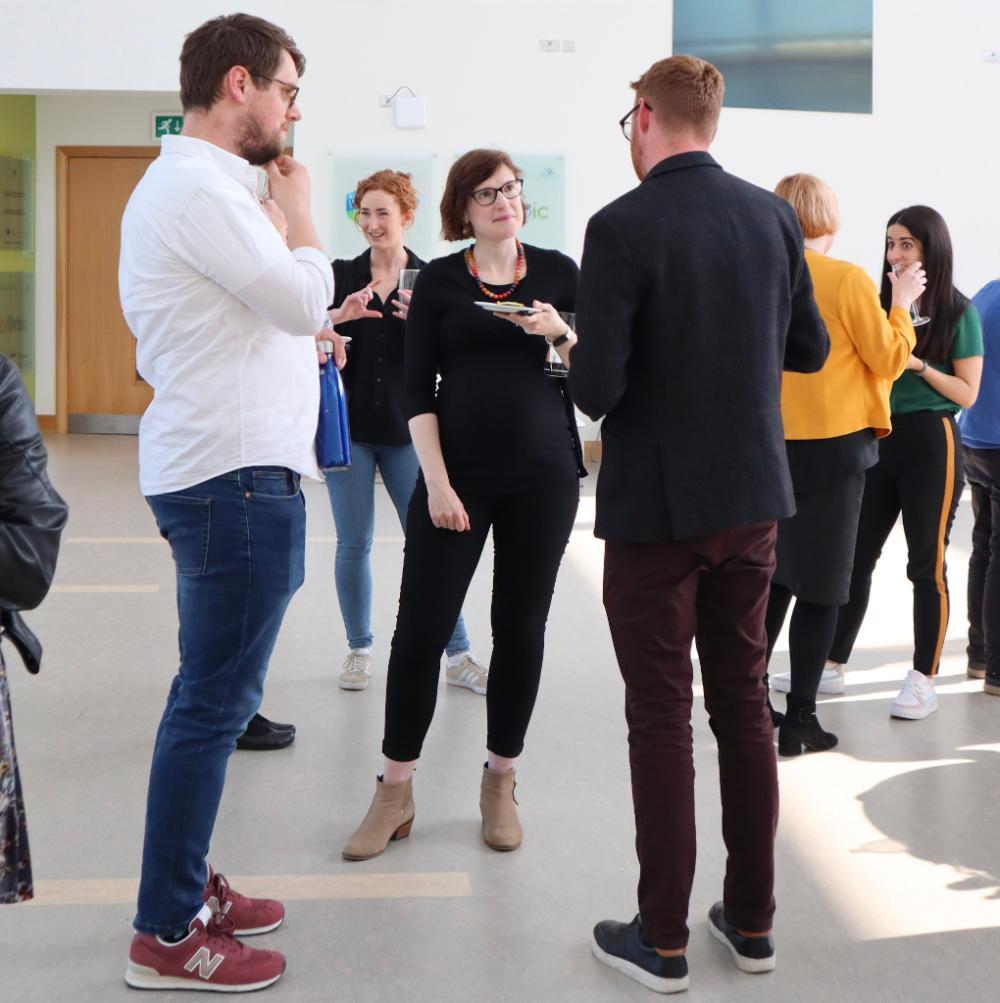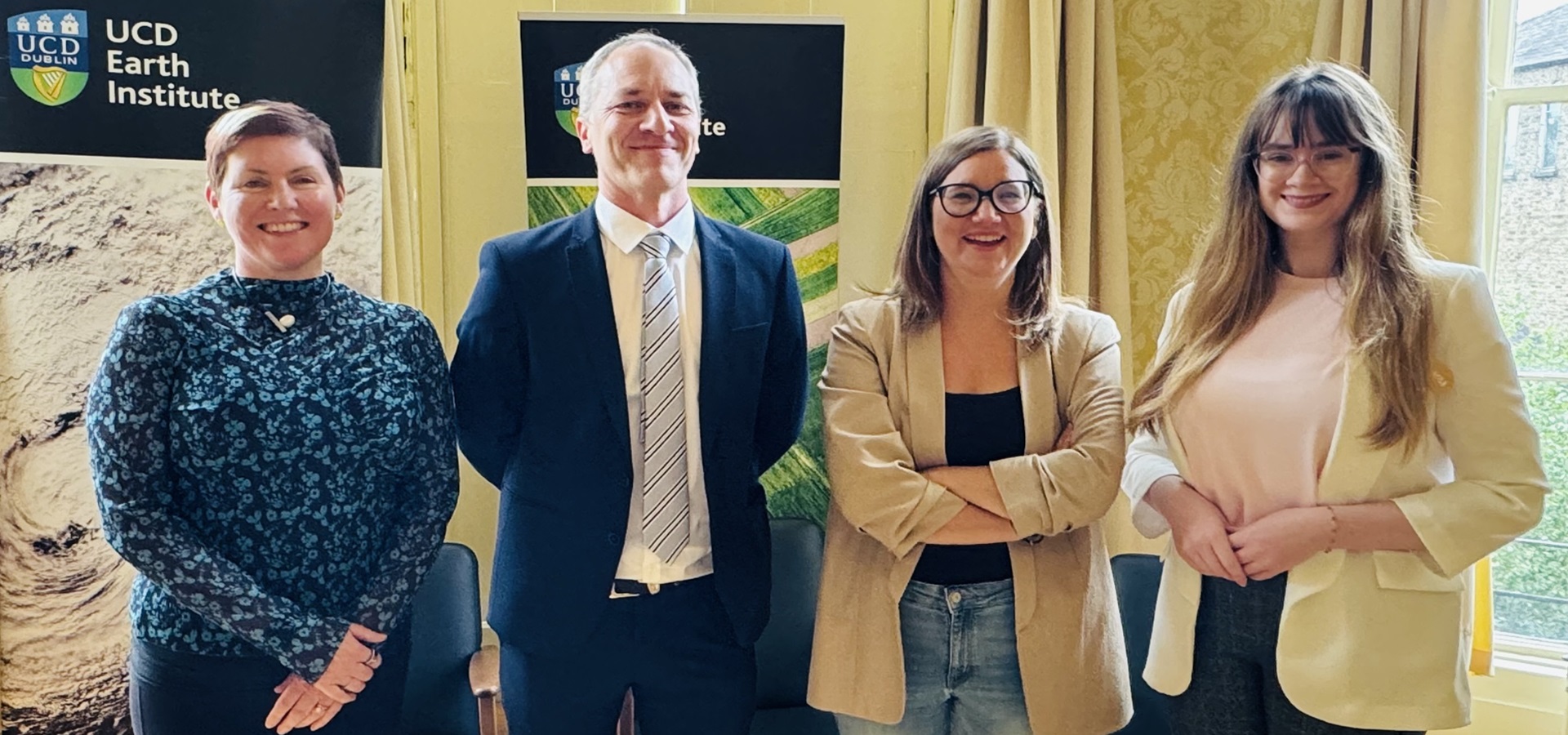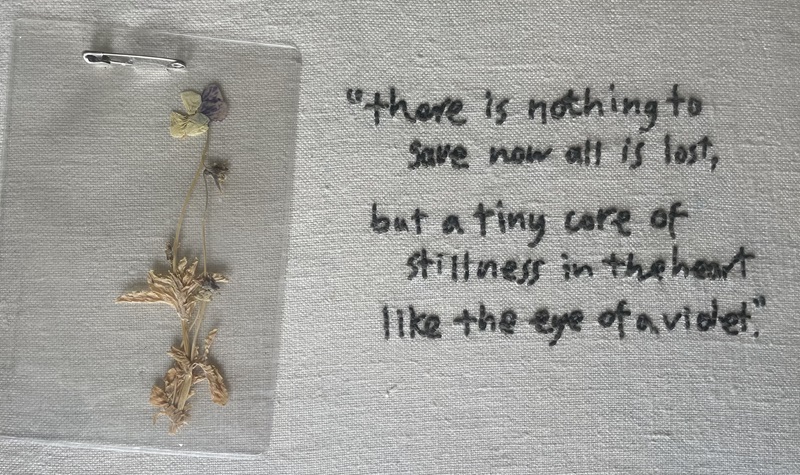MESSAGE: Engaged research for marine protection and energy transitions
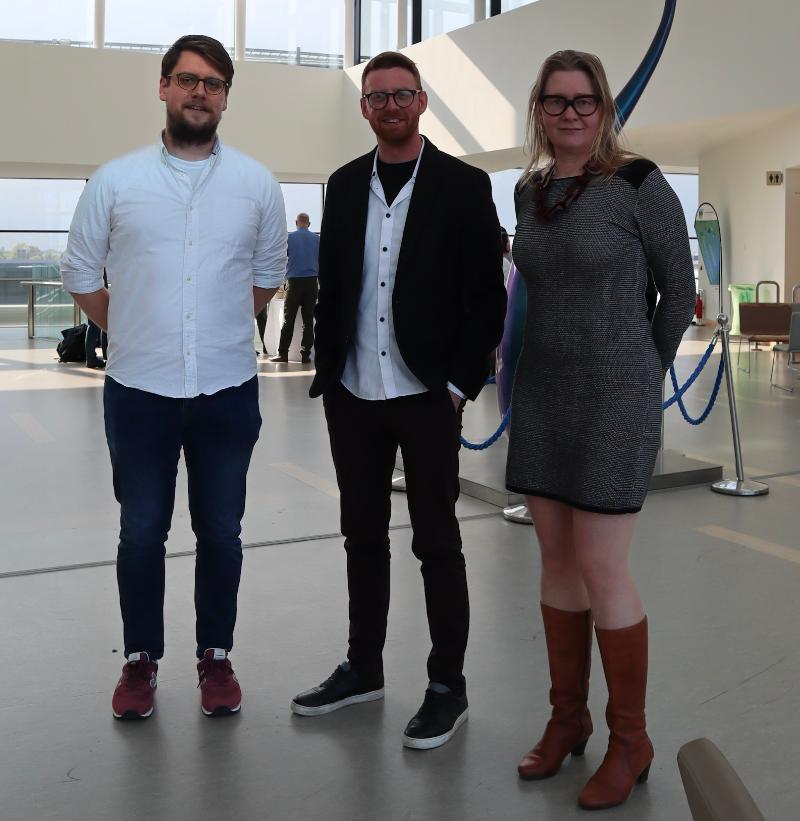
MESSAGE founders Tomas Buitendijk, Geertje Schuitema and Mark Coughlan at the MESSAGE launch event in May 2024.
How do people who live in coastal regions feel about their environment? What are the potential impacts of offshore carbon storage and wind farms? And how can we ensure that the ecosystem people value is protected? Coastal and marine regions are complex, and we need nuanced and engaged research to ensure a good balance that protects ecosystems, culture and the economy.
May 2024 saw the formal launch of a new research group hosted by the UCD Earth Institute with support from iCRAG, the SFI Research Centre in Applied Geosciences. MESSAGE, the Marine & Energy Social Sciences & Humanities Interdisciplinary Research Group, brings together experts across science, arts, humanities and social science to carry out fundamental research with a particular focus on coastal, marine and renewable energy challenges. MESSAGE will use a wide variety of research approaches, including engaged research, and hopes to work closely with coastal communities around Ireland.
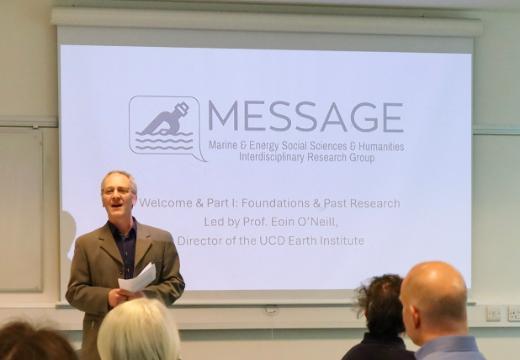 At the launch event, Earth Institute director Eoin O’Neill emphasised the importance of interdisciplinary research for coastal environments, and how marine policy is a rapidly developing area in Ireland.
At the launch event, Earth Institute director Eoin O’Neill emphasised the importance of interdisciplinary research for coastal environments, and how marine policy is a rapidly developing area in Ireland.
“The new research group, MESSAGE, formalises strands of research that have been growing in UCD around energy and the marine environment, and it is one of the best examples of interdisciplinary research in the University,” he said. “The group is formalising at an important time too. Marine protection and policy is currently a hot topic in Ireland as the Government expands the national network of Marine Protected Areas (MPAs), and this research can help to inform policies as they develop.”
Community engagement in coastal areas
The launch event included a session on recent and ongoing research projects, chaired by Geertje Schuitema from the UCD School of Business. Participants heard about the recently concluded ‘Taking Stock’ project, which was led by UCD researcher Tomas Buitendijk together with Britta Thiemt, Mark Coughlan, Tasman Crowe and Geertje Schuitema.
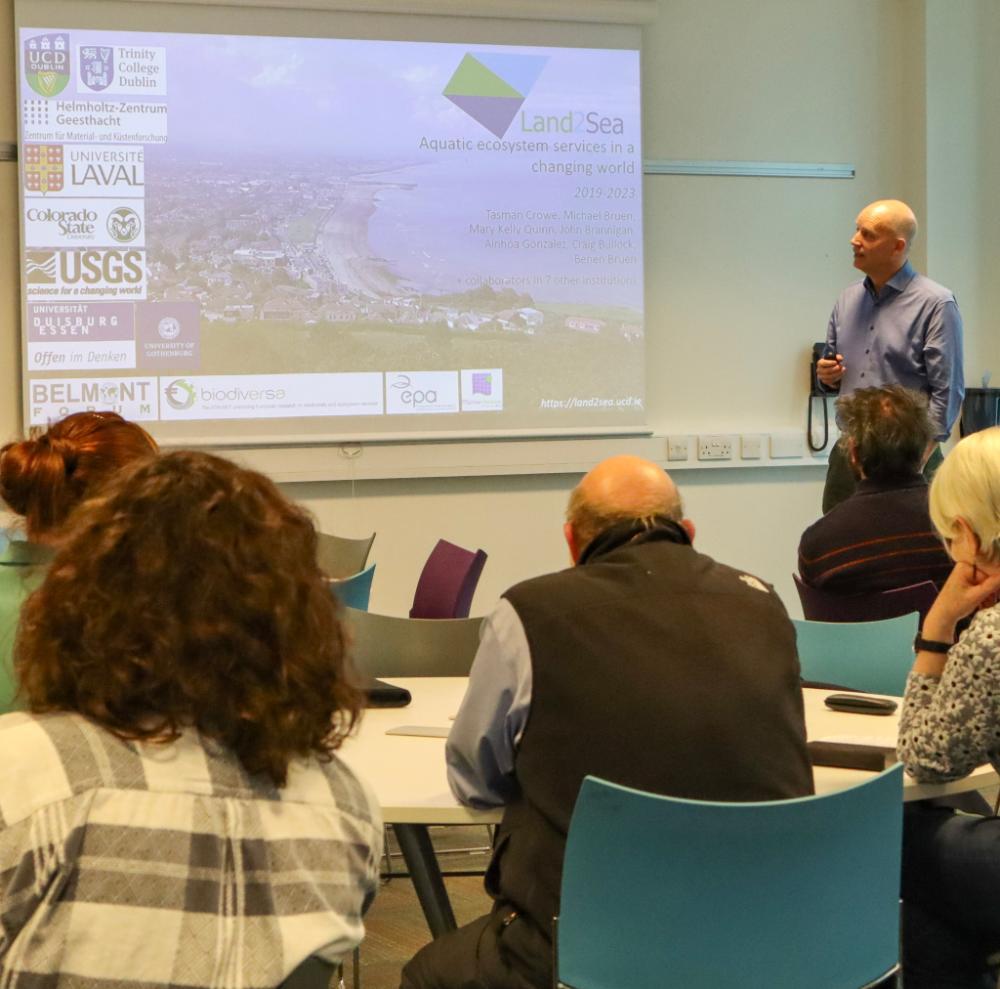
Tasman Crowe presenting about Land2Sea at the MESSAGE launch event
Taking Stock explored the public perception of marine sediments storing carbon in Dundalk Bay and priorities for the future management of the area. The geology of the bay means that local sediments effectively act as a carbon sink, and disruption of these sediments has the potential to impact carbon release. This has potential implications for local activity in the fisheries, recreation and tourism.
‘Taking Stock’ was supported by iCRAG and brought together UCD experts in marine geoscience, psychology, social science and environmental humanities to work with local communities and explore their connections to the environment. The project found that communities have a strong sense of place and local knowledge, and want to achieve a balance between the protection of nature and local economic activity. They also want to have a say in the future development of the bay. One of the outputs of the projest was a policy brief.
A new, four-year Marine Institute-funded engaged research project called ENACT (Energy Narratives and Change in Coastal Communities in Ireland – 2024-2028) will look at the grassroots experience of communities in Co. Clare and Co. Cork who live close to designated energy hubs for proposed offshore wind farms, again using an engaged approach where researchers and communities work together. ENACT is co-led by a team of researchers at the Earth Institute and iCRAG, including Geertje Schuitema, Mark Coughlan, Tomas Buitendijk and Fergus McAuliffe.
“Our intention is to foster dialogue and create a pathway for community input into key decision-making processes related to the energy transition,” said Tomas Buitendijk.
Ecosystem services
The MESSAGE research group traces its foundations to a collaboration between two UCD researchers, John Brannigan, Head of UCD School of English, Drama and Film and Tasman (Tas) Crowe, now Vice President for Sustainability at UCD, around literature and the environment and literature and the sea.
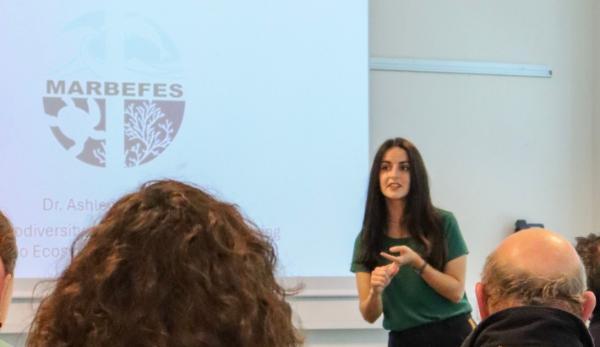 John and Tas have collaborated on past projects to assess the cultural and economic value of coastlines and to bring socio-cultural methods into ecosystem assessment, including an IRC-funded project on the Cultural Value of Coastlines. They went on to develop two follow-on projects, which aim to integrate socio-cultural methodologies into ecosystem assessment, developed with support from the Earth Institute and the UCD Humanities Institute. These projects are Land2Sea and MARBEFES (MARine Biodiversity and Ecosystem Functioning leading to Ecosystem Services). During the MESSAGE launch event, Ashley Cahillane discussed her MARBEFES fieldwork around the socio-cultural valuation of the Irish Sea and understanding the non-monetary benefits of the coast and sea--such as sense of place, recreation, and local identity.
John and Tas have collaborated on past projects to assess the cultural and economic value of coastlines and to bring socio-cultural methods into ecosystem assessment, including an IRC-funded project on the Cultural Value of Coastlines. They went on to develop two follow-on projects, which aim to integrate socio-cultural methodologies into ecosystem assessment, developed with support from the Earth Institute and the UCD Humanities Institute. These projects are Land2Sea and MARBEFES (MARine Biodiversity and Ecosystem Functioning leading to Ecosystem Services). During the MESSAGE launch event, Ashley Cahillane discussed her MARBEFES fieldwork around the socio-cultural valuation of the Irish Sea and understanding the non-monetary benefits of the coast and sea--such as sense of place, recreation, and local identity.
The collaborative, interdisciplinary approach of these projects and teams enables researchers to take stock of a system as a whole, to find out what people value and to identify the aspects and species in the environment that provide that value, noted Tas Crowe.
Seeking new members
The MESSAGE team are keen to work with partners across Ireland and internationally, both on existing and new projects. Any UCD colleagues who are interested in collaborating can contact the team at geertje.schuitema@ucd.ie or tomas.buitendijk@ucd.ie, or see https://www.ucd.ie/earth/message/ for further information.
